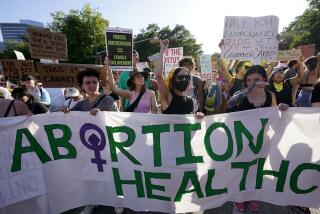Breast Cancer Victims Facing a Tough Choice
- Share via
Women who have breast cancer will face tougher choices and more drastic surgery under the FDA’s moratorium on silicone gel implants, Orange County oncologists said Tuesday.
About 45% of breast cancer patients choose immediate reconstruction at the time of their mastectomies, said oncology surgeon Dr. Alan Wile, who is the director of the UC Irvine-Breast Center. During such procedures, surgeons remove the cancerous growth and replace the breast with silicone gel implants.
“These implants are very beneficial,” Wile said. “It takes a lot of the pain away when women undergo such a drastic surgery. When they leave the operation room, they look very much the same way as before. It takes away some of the tragedy of breast cancer.”
The Breast Center has not yet determined whether to accept the moratorium, Wile said.
“I’m not sure what the legal stand is right now. The hospital may choose to forbid the implants. If that’s the case, my hands are tied. But if they give me the freedom, I would encourage my patients to have it done at the same time. Such delay is inferior medical care,” Wile said.
The FDA’s Food and Drug Administration’s decision to temporarily halt the sale and use of silicone gel breast implants means that cancer patients who choose breast reconstruction may be forced to wait, doctors say.
About 80% of breast implants are performed for cosmetic reasons, but the rest are performed to reconstruct the breast, for example, after the mastectomies.
Those who need breast reconstruction cannot wait 45 days, said John Strong, president of the California Assn. of Plastic Surgery, which has 400 members.
“The doors have been closed for them,” Strong said. “These people are caught short.”
Such delays make mastectomies more traumatic, Wile said, and second operations are often more difficult and risky.
By enacting the ban, the FDA is playing “political football” with breast cancer patients, said Dr. Choong Baick, a surgical oncologist.
“The FDA is being hypocritical about this. They have known for years that tobacco and alcohol have killed millions, but they’re not banned. Here we have silicone implants with no evidence that it has killed anybody, and it’s banned.”
Both doctors and patients are confused about the moratorium because it makes the assumption that the implants are completely unsafe, Strong said.
“There is no absolute safety warranty on any device,” Strong said. “You can’t get that anywhere.”
Baick said he has spent the bulk of his time in the two days since the FDA made its announcement counseling patients.
“Right now, I’m telling my patients all the options and the fact that I think the implants are relatively safe,” Baick said. “Nothing in this world is 100% safe. But the FDA is creating hysteria here. I have not seen a single silicone-induced cancer in my practice or my career.”
More to Read
Sign up for Essential California
The most important California stories and recommendations in your inbox every morning.
You may occasionally receive promotional content from the Los Angeles Times.










